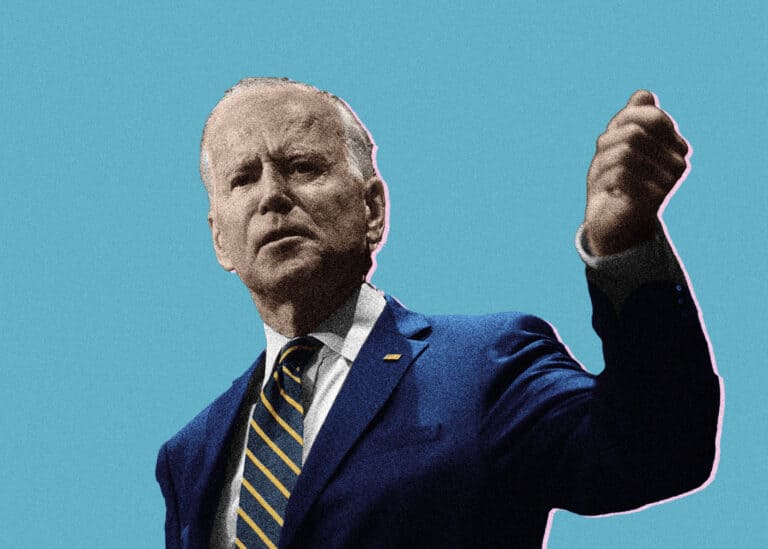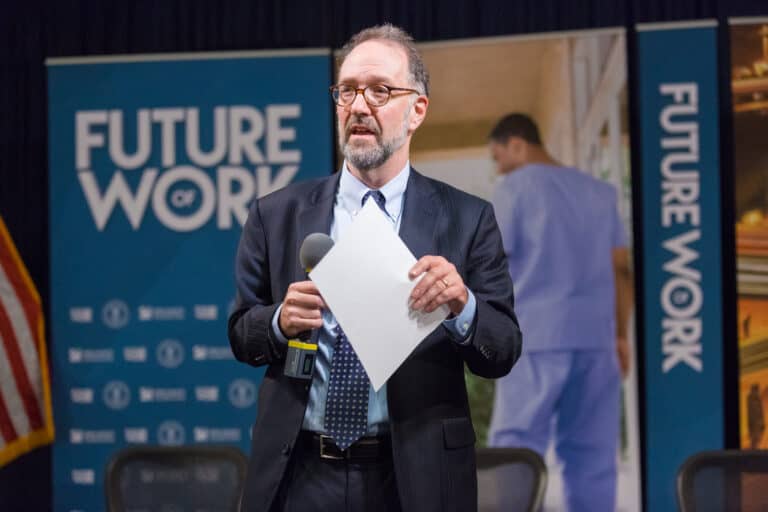
Sharon Block is a Professor of Practice and the Executive Director of the Center for Labor and a Just Economy at Harvard Law School.

Benjamin Sachs is the Kestnbaum Professor of Labor and Industry at Harvard Law School and a leading expert in the field of labor law and labor relations. He is also faculty director of the Center for Labor and a Just Economy. Professor Sachs teaches courses in labor law, employment law, and law and social change, and his writing focuses on union organizing and unions in American politics. Prior to joining the Harvard faculty in 2008, Professor Sachs was the Joseph Goldstein Fellow at Yale Law School. From 2002-2006, he served as Assistant General Counsel of the Service Employees International Union (SEIU) in Washington, D.C. Professor Sachs graduated from Yale Law School in 1998, and served as a judicial law clerk to the Honorable Stephen Reinhardt of the United States Court of Appeals for the Ninth Circuit. His writing has appeared in the Harvard Law Review, the Yale Law Journal, the Columbia Law Review, the New York Times and elsewhere. Professor Sachs received the Yale Law School teaching award in 2007 and in 2013 received the Sacks-Freund Award for Teaching Excellence at Harvard Law School. He can be reached at [email protected].
One year ago, we released our Clean Slate for Worker Power report. The report opened by invoking the idea that concentrated economic and political power threatens the functioning of democracy. We recognized that this idea shaped the New Deal and led to the National Labor Relations Act’s historic protection for union organizing and collective bargaining. We argued that in the decades following the New Deal, as corporate power grew and worker power diminished, dual crises of economic and political inequality developed. The motivating idea behind Clean Slate was the urgent need for a new labor law, one that could enable workers to demand a more equitable economy and politics.
The dramatic events of 2020, just beyond the horizon at the report’s release, make the case for fundamental labor law reform painfully more pressing. The pandemic and its resulting recession have devastated workers and their communities. Women and people of color have suffered the most. These effects stem in part from our legal system’s failure to provide workers with a viable means to aggregate power and demand better.
In June, we quickly reassembled the Clean Slate network to develop recommendations on how labor law reform could empower workers to protect their physical and economic well-being in the face of the pandemic. The result was a new Clean Slate report: Worker Power and Voice in the Pandemic Response.
Today, the goals of the Clean Slate project remain more urgent than ever. As the Biden Administration begins, and pro-labor leaders take the reins in both the House and the Senate, optimism about labor law reform has grown. In fact, labor law reform – in the form of the PRO Act, the most ambitious labor law legislation introduced since the National Labor Relations Act – is high on the list of these leaders’ priorities.
This shift in the political viability of the PRO Act makes the Clean Slate report more relevant. The reforms proposed in Clean Slate can be viewed as what comes next – what should be built on the foundation provided by the PRO Act reforms. And, over the course of the past year, we have taken two steps to make Clean Slate more viable. First, we awarded nine grants to groups working at the state and local level to advance projects in the spirit of Clean Slate, including projects on just cause dismissal, collective bargaining rights for workers excluded from the NLRA, and digital organizing strategies. Second, we launched deeper dives into the Clean Slate report recommendations, enlisting experts to draft a collection of papers that aim to serve as roadmaps for how to actually enact Clean Slate labor law reforms.
These deeper dive papers cover a number of topics, including sectoral bargaining, standards for preemption, scope of bargaining topics, workplace monitors, democratic participation and just cause standards. Each paper lays out the key decisions that stakeholders will need to consider and that policymakers will have to make to craft labor law reform legislation in each area. The clarity and simplicity of these papers demonstrate that fundamental labor law reform is not a pipedream, but a reasonable aspiration. When Congress passes the PRO Act, the reasonableness of these approaches will grow even more.
Because the need for fundamental labor law reform continues, the Clean Slate project will continue. In 2021, Clean Slate will produce roadmaps for other aspects of the initial recommendations. Clean Slate also will explore more deeply themes that we flagged in the initial report – the integral relationship between building worker power and addressing other policy imperatives like the climate crisis, racial and gender justice and democratic renewal. We hope to fund another round of grants to support more pathbreaking projects at the state and local level. And, as new challenges for American workers arise in 2021, Clean Slate will offer a space for innovative thinking about how to empower workers so they can better tackle those challenges.
We finish the year since the report’s release much where we started it – inspired by American workers’ determination to be heard, despite the failures in the law meant to lift up their voices. From Amazon workers who walked off the job to demand better COVID protections, to essential workers who fought for treatment consistent with their new title, to members of the Alphabet Workers Union who are fighting for a new kind of union at Google. We are inspired by all this organizing work, and we remain committed to building a law that ensures such work is not so hard.










Daily News & Commentary
Start your day with our roundup of the latest labor developments. See all
July 4
The DOL scraps a Biden-era proposed rule to end subminimum wages for disabled workers; millions will lose access to Medicaid and SNAP due to new proof of work requirements; and states step up in the noncompete policy space.
July 3
California compromises with unions on housing; 11th Circuit rules against transgender teacher; Harvard removes hundreds from grad student union.
July 2
Block, Nanda, and Nayak argue that the NLRA is under attack, harming democracy; the EEOC files a motion to dismiss a lawsuit brought by former EEOC Commissioner Jocelyn Samuels; and SEIU Local 1000 strikes an agreement with the State of California to delay the state's return-to-office executive order for state workers.
July 1
In today’s news and commentary, the Department of Labor proposes to roll back minimum wage and overtime protections for home care workers, a federal judge dismissed a lawsuit by public defenders over a union’s Gaza statements, and Philadelphia’s largest municipal union is on strike for first time in nearly 40 years. On Monday, the U.S. […]
June 30
Antidiscrimination scholars question McDonnell Douglas, George Washington University Hospital bargained in bad faith, and NY regulators defend LPA dispensary law.
June 29
In today’s news and commentary, Trump v. CASA restricts nationwide injunctions, a preliminary injunction continues to stop DOL from shutting down Job Corps, and the minimum wage is set to rise in multiple cities and states. On Friday, the Supreme Court held in Trump v. CASA that universal injunctions “likely exceed the equitable authority that […]